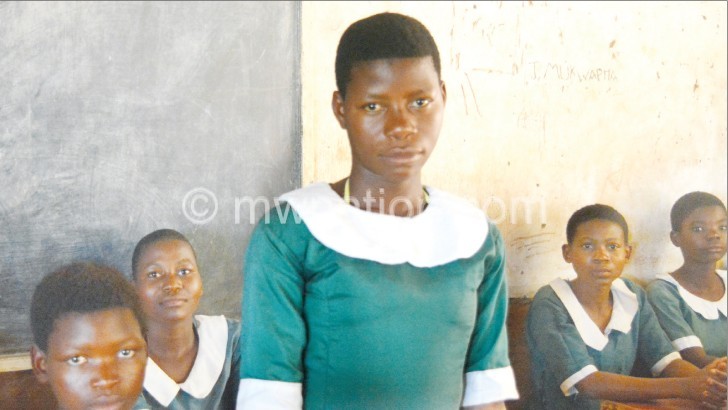Ending early marriages in Mulanje
Fifteen-year-old Bonisa Seyani, a Standard 5 learner at Monjole Primary School in group village head (GVH) Nsikita, Traditional Authority (T/A) Njema in Mulanje is back at school after spending over a year in marriage.
The girl, who hails from Malunda Village, just five kilometres away from Mozambique border, says her marriage ended because of abuse she was facing from her husband.
Bonisa is not alone—there are several girls who dropped out of school to get married in her area. Christina Yohane, 21, married at 15 because her parents were too poor to keep her in school, so she says.
While this is the case in Mulanje, the district is not alone in this situation of girls dropping out of school to get married.

Situation elsewhere
The story is the same in many districts across the country.
Acting district education manager (DEM) for Dedza, Sollely Mwale, says girls sometimes drop out of school to marry after getting pregnant.
His counterpart in Mzimba South, Fanuel Chiwowa, says marriages have increased the number of school dropouts.
Paul Chiphanda, DEM for Blantyre Rural, says eight percent of pupils in 160 schools dropped out, mostly, due to early marriages.
There are 4 901 009 pupils in public primary schools in Malawi of whom 2 461 404 are girls. However, 320 000 are dropouts, representing 14 percent of the total enrolment.
In Mulanje, 4 467 girls out of 105 223 girls in 164 schools dropped out of school, according to the district education office.
A 2016/17 academic year report of the Ministry of Education, Science and Technology states that female students drop out because of various reasons, including getting pregnant and poor facilities.
About 4.2 percent drop out due to marriages and 2.8 percent drop out due to pregnancies, the report reads.
Interventions
To encourage school attendance, Malawi Government’s Education Act provides for free primary school education.
Other education policies include re-admission of girls who dropped out due to pregnancies and marriage and the school feeding programme.
There are similar programmes across the country that DEMs are doing to end school dropouts such as involving the police to hunt for girls that are in marriages and using mother groups to encourage those that are in marriages to return to school.
In Mulanje, where Bonisa and Christina come from, there are several organisations that are working to bring girls back to school. One such organisation is Youth Net and Counselling (Yoneco). The organisation, with funding from Christian Aid, is taking girls from marriages back to school.
Yoneco field officer Enala Msukwa, who has been involved in programmes that encourage girls to go back to school, says her organisation encourages girls to report any form of abuse, including that of forced marriages, to them [Yoneco] or police.
“We receive issues of abuse of girls from schools and homes. If someone is forced to marry or is raped, they should report to us immediately, this is what we encourage the girls to do,” says Msukwa.
Strides made
Chairperson of Young Queens Youth Club in T/A Njema, Lucy Chibade, says girls are getting out of marriages to go back to school following initiatives by Yoneco.
“We have managed to send back four girls to school in our village of Namasalima.
“Also, many more are going back to school from many villages,” she says, adding: One girl who was fished out from marriage to school has sat for this year’s Malawi School Certificate of Education(MSCE) examinations. There is also a girl who was a prostitute but now has changed her ways.”
With initiatives such as these, the district education office is not idle either. Mulanje DEM Gossam Mafuta says: “We are encouraging chiefs to come up with by-laws that will forbid early marriages. We are also building school blocks with Local Development Fund (LDF) to address the problems of shortage of classrooms.”
Charles Luka, a male champion working with Yoneco, says the problem is that many parents do not realise the evils of forcing girls into marriages.
He also blames people from across the border who marry young girls.
Christian Aid country director Pansi Katenga says her organisation is impressed with Yoneco’s interventions in Mulanje.
“Christian Aid, with funding from Action Aid, is funding Yoneco and Malawi Girl Guides Association in Mulanje and other places in the country in several projects including getting girls out of early marriages,” says Katenga.
“So far, I am impressed with what I have seen on the ground. Yoneco is working really hard. We want the girls to go back to school and live dignified lives.”
Wise Ndawa, Mulanje Mission Hospital HIV and Aids coordinator, says girls are becoming pregnant at 10 to 15 which is posing dangers to their lives.
“These girls can’t bear a child normally so they undergo operation. There is also another risk for girls who sleep with men at a tender age–they can contract cervical cancer,” he warns.
Monjole Primary School head teacher Mercy Jambawe says they receive girls from marriages and encourage them to work hard.
There are 2 865 pupils at Monjole, of whom 1 432 are girls. This year alone, according to Jambawe, 60 girls dropped out to get married and from February, Yoneco has reached out to 8 641 girls with reproductive health services which aim at making girls stay in school. n





